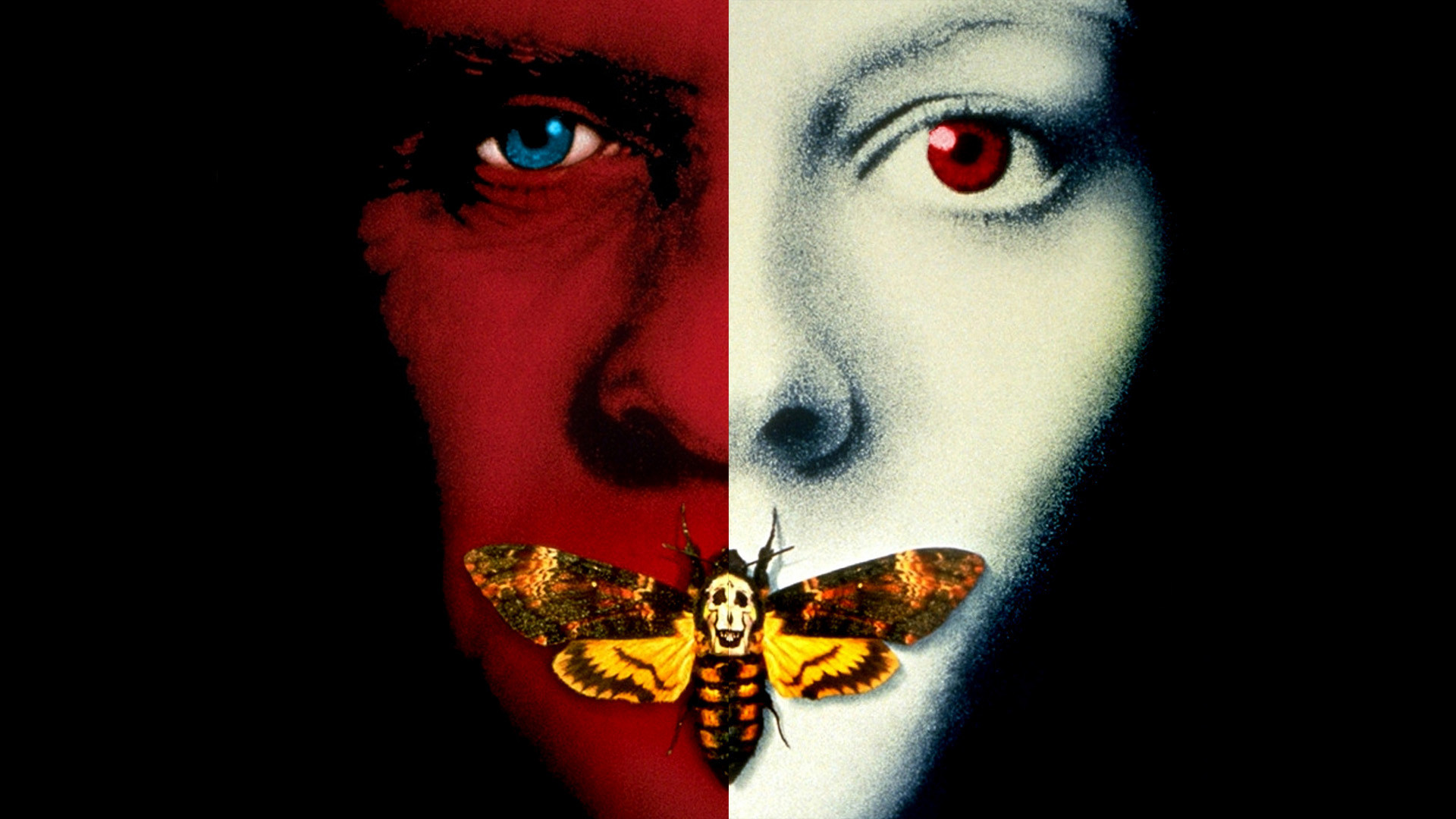
Book Vs. Movie: "The Silence of the Lambs"
Here at Bloody Good Horror we’ve never shied away from controversy or giving you our honest opinions regardless of the outcome. We’ve decided to tackle head on and bring down one of the oft stated but rarely examined opinions that the book is ALWAYS better than the movie. The best way to drag this old beast to the ground and put a bullet in its head is to take the classics and break them down.
Each month, CC and Jayson will take a classic of the genre and debate its relative merits until we can find a clear answer. Our first topic is a big one, considering that the film was a Best Picture winner. Could the book possibly be better? Let's get into it...
The Silence of the Lambs
Plot
Jayson: The overall plot of Silence of the Lambs from a book and movie perspective are very much aligned. In terms of sheer number of changes from book to film, this may be one of the most faithful adaptations of a book I have ever seen. The flow of events are rarely taken out of order merely condensed for the sake of economy.
However, the book deals with a lot of internal federal politics and insight that the movie only scratches the surface of and yet is an incredibly quick and enjoyable read for the subject matter at hand. For that alone I need to give this to the book.
CC: I have to agree with Jayson, I think that the original source material wins in this instance. (Not that there’s a huge difference between the two nor is really much that is truly “left out.”) I’ve seen some movies do a great job of simplifying or at least condensing a book’s plot – but in this case, I really liked more of the in depth explanation of FBI happenings and the character development that gets a bit rushed in the film.
Jayson’s Verdict: Book
CC’s Verdict: Book
Characters
Jayson: I walked into this feeling like because of how iconic of a character Hannibal Lecter is as played by Anthony Hopkins in this film I should be inclined to give it to the movie right away. I mean certainly we’ve seen a few incarnations of the character at this point, including a brilliant depiction by Mads Mikkelsen on TV, but still when you think of Lecter you think Hopkins. I expected to find in retrospect the character to be too theatrical for my taste, instead I found a renewed sense of awe at the portrayal. Doctor Lecter IS theatrical, it is a very important aspect of who he is as a character and it is wonderfully played by Anthony Hopkins.
That being said, despite a really strong performance by Jodie Foster, and after rereading the book, a lot of the nuance of Clarice Starling is robbed from the character in the movie. In the book, she is a very deep character and in fact a lot of this book is dedicated to demonstrate in vivid detail the gender politics of her role in the FBI. The book tells us: Over this odd world, this half the world that’s dark now. I have to hunt a thing that lives on tears. This is Starling’s thoughts upon recognizing the sacrifices it takes to catch monsters. She is knowing participant, she is an agency unto herself. In that regard for a book written in 1989 this is a pretty progressive book, let alone the time it spends teaching us about transgender people which is basically a throwaway line in the movie. Also, the character of Jack Crawford is completely mishandled in the movie due to a lack of attention to the sacrifices he has made for the job and how that highlights Starlings own.
For these reasons I’m going book.
CC: I’ve always been really fascinated by both Hopkins and Foster’s portrayals and found both so incredible. Even though a lot of the “nuance” of the book Clarice is left like Jayson mentioned, I really appreciate the delicacy of Foster’s performance, even from the first time I saw it. Though we obviously do not get the most personal details of Clarice’s character as the book really shapes her as an individual – I thought that Foster did really well navigating those edges with just enough softness that highlights her as a woman but never naïve or incapable. She’s never given enough room to fully flex those muscles, but Foster does wonders with what she is given. Hannibal in the book is a titan. He’s described as having red eyes and six fingers on one hand, yet he’s so captivating and engrossing. He’s so very weird yet strangely sexual and exudes confidence. That being said, Hopkins is a lot of those things in his own way and his intelligence as a being is just magical to watch. Though now we’ve seen a slightly different (arguably closer to the book) adaptation with Mikkelsen- Hopkins still terrifies as Hannibal. Again, Jayson beats me to the punch, but theatrical is a perfect description of Hopkins’ performance, it’s not that it is bad – it’s just emphasized in a very particular way.
Definitely agree that Jack Crawford is completely mishandled in the film. There’s a lot of back story that is ignored not only from his sacrifices-but also how he sees Clarice as redemption for his mistakes with Will Graham, and how all those stories mirror one another and weave together. Also, I know there was a lot understandable and deserved controversy around the Jame Gumb/Buffalo Bill character, which I’ll touch on a bit more under the theme question, but solely based on performance, Ted Levine is fantastic. He does an awesome job of balancing the complex emotion and thoughts of someone so deranged. Also, his voice will forever be associated with a serial for me – even though I love him as an actor in general.
Regardless of my appreciation for the actors’ performances – I have to say the book wins in this category.
Jayson’s Verdict: Book
CC’s Verdict: Book
Theme
Jayson: Here as far as I’m concerned the discussion is a matter of approach as I think both the film and the movie are both closely aligned in theme. As I mentioned in the character segment Clarice Starling’s aspirations and motivations are much more clearly drawn in the book than in the movie. The title is in reference of course to the lambs slaughtered on the farm where Starling grows up after losing her father. Her loss is shown to us through flashback images throughout the film, in the book the information is drawn out of Starling against her will by Dr. Lecter. The former is a better decision for a film being a visual medium and it’s very effective seeing the tiny Starling looking over her dead father on the slab in juxtaposition of the Buffalo Bill victim. The film accomplishes a level of depth that is beyond what we see in a typical serial killer movie by giving us these details in piece meal and fed to us by a wonderfully vulnerable performance by Jodi Foster.
CC: I honestly think this is one of the best adaptations from page to screen that anyone has made. (I mean it did win an award for it) That being said, I think that both mediums do a really good job of trying to illustrate the themes presented. The sexism that Clarice faces in life, as well as in her job as an FBI Agent, is more fleshed out in the book, where the movie tends to just show her in different settings where she is subjected to very obvious, and often very physical sexism. The loss and rage the Clarice has and continues to experience is well developed in both the book and the movie, but probably best shown as visual flashbacks in the film; however, Buffalo Bills’ loss and rage is rather explained and well developed throughout the book, and only really alluded to in the film, as mere ‘motivation.’ Both the film and the book handle the theme of transgender individuals rather poorly – though I’d have to reason that the book does try a little harder to backpedal and clear up comments a little more polite and correct.
Jayson’s Verdict: Movie
CC’s Verdict: Book
Tone
Jayson: Rarely have I seen the tone of a book better depicted on screen. The glib theatricality of Hannibal Lecter. The wide doe eyed innocence of Clarice Starling slowly stripped away from her as her innocence is robbed of her. The strange machinations of Buffalo Bill. Despite a miss on how deep some of these characters are the tone of their personality in their dialogue and performances as well as the sets and music are all picture perfect. This is a very difficult task for a movie to achieve, for that sake my verdict is movie.
CC: Very similarly to theme, I think the tone of the movie really mirrors and compliments the book. Though we seen differences in character detail or plot explanation – the overall tone of the material is very much present. Though the book is the source material, I think the movie might prevail in tone. The book does give you everything you need to develop the tone of the book – yet there’s just something about seeing it drawn out for you on screen. With Howard Shore at the helm, the film takes on a life of its own-the persistent darkness of the cinematography never dulls or bores and drives the audience’s attention. It’s rare for a film to really have you experience and empathize – yet this one really does. Also, in the book the conversations between characters tend to run a bit long and winding which can sometimes confuse the situation rather than elevating it.
Jayson’s Verdict: Movie
CC’s Verdict: Movie
Overall:
Jayson: There’s no doubt this is a great movie. A timeless classic that will never get old. You know that this is a good movie because the critics don’t want to admit it’s a horror film. That being said, all that is great about this film minus the performances is in this book with an added layer of depth that the movie just isn’t able to muster in a reasonable run time, and yet it’s an incredible quick and easy read. As great as this movie is, the book is so and more.
CC: I know I’m a book worm and I hate to feel the first VS out of the gate, and I have to go with the book – but it’s true. (I promise there are movies I like more than I liked the book!) Regardless, I read this book when I was probably way too young to be reading this and I think that might be a large part of my bias. The film is also a definite favorite of mine and it deserves all the accolades it has won, I mean it’s a horror movie that won an Oscar. I just enjoyed a lot more of the book than I did the film and it seemed that the book was able to really achieve what the film didn’t have time to finish.
Jayson’s Verdict: Book
CC’s Verdict: Book
Well, that one is behind us. We’ve declared a winner by TKO this time the book takes it.
Please join CC and myself next time on The Something Read Podcast later this month as we discuss, debate, and declare a winner in a highly controversial topic: Stanley Kubrick’s vs. Stephen King’s The Shining.

